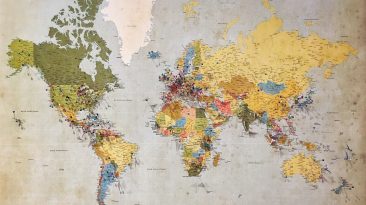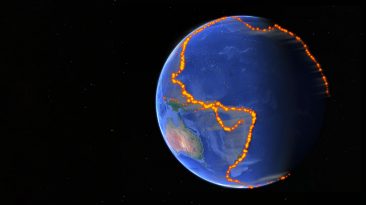What if I told you Latin America could have hosted one of the world’s greatest superpowers? Capable of changing the course of history in ways that only players like the U.S., China or Russia can today. And to do that, you’d only need one thing. Uniting all of its countries into a single state. How would this supernation turn into an economic powerhouse? Would it be a democracy or a dictatorship? And why wouldn’t other governments dare mess with it?
Latin America is spread over both North and South America, with 19 sovereign states and one independent territory. Most of them considered developing nations. There’s some debate about what exactly is Latin America. For this scenario, we’ll go with countries in the Americas where Spanish and Portuguese are predominantly spoken.
Many people have had ambitions of combining them to form a larger nation. The most famous of them being Simón Bolívar, known in South America as The Liberator. This Venezuelan led the fight for independence from Spain across the region. And he believed uniting Latin America would be vital for its economic and political success in the world.
So what if Bolívar did manage to build one united nation? How could this superstate turn into the world’s most feared dictatorship? The first step to accomplish this would be to convince each nation’s elites to team up. With enough concessions, deals and compromises, the wealthiest classes of Central and South America would have been swayed to join their states.
The Liberator would then have been appointed as the first president or prime minister of this union. This superstate would be one of the largest nations on the planet, stretching from the border with Texas in the north to Tierra del Fuego in the south. Altogether it would include Spanish and Portuguese South America, the Caribbean, Central America and Mexico.
That’s a total of more than 20 million km² (7.8 million mi²). Larger than the United States and Canada combined. And what a region it would be. The Amazon rainforest in Brazil. Coastal waters and islands in Puerto Rico, Cuba and the Dominican Republic. The Andes mountain range that goes from Chile, and all the way up to Colombia. Glaciers in Argentina.
Tropical grasslands in Venezuela. Deserts in Chile. These would be just a tiny fraction of the multitude of landforms in the supernation, many of them rich with natural resources and arable land. The potential for tourism, year-round agriculture and manufacturing would make the rest of the world jealous. Eight percent of humanity, as well as 8% of its GDP, would reside within its borders.
That’s around 660 million inhabitants, in one of the most diverse societies in the world. A nation with an astonishing abundance of different peoples, traditions and cultures. Everyone in this new united supernation would speak either Spanish or Portuguese. All public documents would be printed in both languages. And schools would teach students to have at least a basic knowledge of the two.
With this biodiversity of land and the sheer size of its workforce, this Latin America could become an economic superpower. Just like the United States and China. It would export everyday staples like tobacco, beef, corn, wheat, fruits, beans, vegetables, sugar. Oh, this list is long. Most countries would be doing business with this food production giant.
Brazil alone already leads the world in coffee production, harvests a quarter of the global citrus, has over 1/10 of all cattle supply and produces 12% of the sugarcane. It’s already made it to the list of top 20 dominant economies on the planet thanks to its massive iron and aluminum ore reserves.
As part of a bigger country, where it could share even more resources with other territories, Brazil’s economic might would only be greater. Imagine what it could do with Venezuela, which has the planet’s largest oil reserves in its possession.
Naturally, Latin America would have its own common currency. Just like in the European Union, it would make the region more attractive for international business. So it seems like the Latin American supernation, if successfully formed, held together and managed, would fulfill Bolívar’s dream of an astonishing, democratic superpower. Right?
Well, things are never that simple. Latin America’s abundance of natural resources comes at the price of widespread political and social unrest. See, the power would reside almost solely on the wealthiest elite. As time went on, severe inequality would get worse. An impoverished majority would be socially, politically and financially marginalized by a small group of oligarchs.
Class warfare would become inevitable. And with it, the arrival of a prevalent figure in Latin American history. The caudillo. Also known as a strongman, this is a breed of military and political leader with a big personality and gift for creating populist discourse. Fidel Castro in Cuba and Augusto Pinochet in Chile fit the ticket.
Extreme social division and discontent would set the stage for the rise of one of these strongmen. They would speak for a silent majority, who in return would support their rise to power. But once the caudillo took the reins, they wouldn’t want to let go. And they could turn democracy into a dictatorship. But how would this strongman hold on to one of the planet’s superpowers?
After all, Latin American countries currently don’t have the most advanced or well-funded militaries. In 2016, their combined defense budget of $67 billion was barely a drop in the bucket compared to the $801 billion of the United States. On the other hand, the region does have a lot of soldiers, almost two million troops.
Looks like this superstate dictatorship wouldn’t have the best-equipped military. But it would be big enough to control and suppress its population and neutralize an uprising. When it comes to dealing with foreign enemies, Latin America would require more drastic measures. It could side with Russia, a military powerhouse. And that would mean that Latin America would now have humanity’s most destructive weapon. Nukes.
This would change geopolitics worldwide. The U.S. would either have to keep the peace or face having an enemy at its gates. It would stay away from funding military coups to remove anyone in power. It would just be too risky to do that to a Latin America armed with nukes. The influence of the West around the world would be severely reduced.
Despite this, the U.S. would still make out alright. With its vast mineral and energy resources, food exports and tourism opportunities, most American companies would turn a blind eye to the human rights abuses of the Latin American regime. So one of the planet’s mightiest superpowers would also be one of its most solidified and accepted dictatorships.
You might want to reconsider where to take your tropical vacation in this new reality. As a single country, Latin America could become a dangerous new threat to the whole world. But what if we united all of the countries on the planet?
Sources
- “What Is Latin America? Definition And List Of Countries”. Rebecca Bodenheimer. 2019. thoughtco.com.
- “AMLO Wants A United Latin America”. Kurt Hackbarth. 2021. jacobin.com.
- “What are the benefits of the euro?”. 2022. european-union.europa.eu.
- “Union Of South American Nations (UNASUR) | Cancillería”. 2022. cancilleria.gov.co.



























